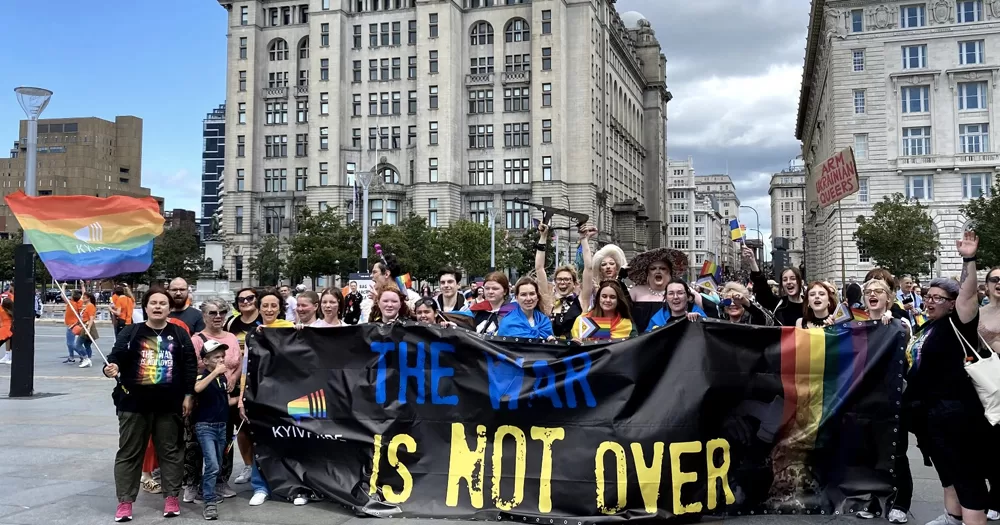Activists from Ukraine, Moldova and Bosnia have expressed hope that the prospect of becoming members of the European Union (EU) will improve LGBTQ+ rights in their countries. The three nations are next in line to start talks about the process of accession to the EU, which involves compliance with certain criteria, including a good track record on LGBTQ+ rights.
In November, EU Commission President Ursula von der Leyen announced the recommendation to start talks with Ukraine, Moldova and Bosnia, specifying that it could only happen if certain conditions related to the rule of law and democracy are met.
Von der Leyen added that Georgia would be added to the list of countries that are in talks about joining the EU (also called ‘candidate countries’), which currently also includes Albania, Kosovo, Montenegro, North Macedonia, Serbia and Turkey.
After Russia’s invasion last year, the European Council granted Ukraine the status of candidate to join the EU. Now the recommendation to start talks must be approved by all 27 member states at a summit that will take place in December, before the country can progress further in the process of accession.
However, the EU Enlargement process is a complex and lengthy commitment. Countries like Serbia and Montenegro have been candidates for years and still have a long way to go before they can become members of the Union. Even with the most optimistic forecasts, Ukraine, Bosnia and Moldova probably won’t be able to access the EU before 2030.
In order to join the EU, countries need to comply with certain criteria to ensure a degree of protection against the risk of new entrants becoming politically or economically burdensome for existing members. The talks between the European Union and each of the candidate countries revolve around the ‘acquis communautaire’, which is the body of EU legislation that candidates need to implement at a national level if they want membership.
Among the requirements that a candidate needs to fulfil are ensuring that the country has stable institutions guaranteeing democracy, the rule of law, human rights and protection of minorities, as well as a functioning market economy. Because of the commitment to advancing the protection of minorities and human rights, LGBTQ+ rights have acquired a special place in the process.
Every year, the European Commission publishes an annual report to monitor how each candidate country is progressing. Such reports also address the situation of the LGBTQ+ community in each country and, in addition to the legislative aspects, particular emphasis is also placed on the ability of a state to guarantee the organisation of safe Pride events. The fact that such importance is ascribed to Pride shows how the EU’s requests in matters of LGBTQ+ rights go beyond the content of the acquis.
Ukrainian lawmaker Inna Sovsun explained that, while the legal recognition of same-sex unions is not currently among the conditions to join the EU, some member states – such as the Netherlands and Nordic countries – consider it a “litmus test” to gauge a country’s commitment to progressing towards accession.
At present, Ukraine, Bosnia and Moldova score among the worst countries in the EU and neighbouring areas in ILGA-Europe’s ranking of the LGBTQ+ rights situation. None of them currently recognise same-sex civil partnerships and activists in the countries have long been fighting for legal protections for transgender people.
“Each step towards the EU gives us hope that sooner or later we will have equal rights and these rights will be protected,” said Leo Zbancă of the GENDERDOC-M Information Centre rights group in Moldova, speaking to Openly.
The leverage of membership represents a powerful tool to ensure that protections of LGBTQ+ rights are put in place in the countries that hope to join the EU. “(LGBTQ+ rights) will be gaining more momentum and more attention as we move forward on the European integration side,” Inna Sovsun said.
At the same time, the EU’s ability to progress LGBTQ+ rights in candidates can also be tied to the fact that countries are motivated to comply with the criteria for accession by the prospect of membership. Once that motivation is gone, things start getting more complicated.
Indeed, some countries have experienced so-called “homophobic backlashes” after accession to the European Union, because LGBTQ+ rights started to be perceived as something that was imposed from the outside, namely EU institutions, and that was not compatible with the country’s national identity and values. This happened in Poland, Hungary, Lithuania and to some extent also in Croatia.
© 2023 GCN (Gay Community News). All rights reserved.
Support GCN
GCN is a free, vital resource for Ireland’s LGBTQ+ community since 1988.
GCN is a trading name of National LGBT Federation CLG, a registered charity - Charity Number: 20034580.
GCN relies on the generous support of the community and allies to sustain the crucial work that we do. Producing GCN is costly, and, in an industry which has been hugely impacted by rising costs, we need your support to help sustain and grow this vital resource.
Supporting GCN for as little as €1.99 per month will help us continue our work as Ireland’s free, independent LGBTQ+ media.
